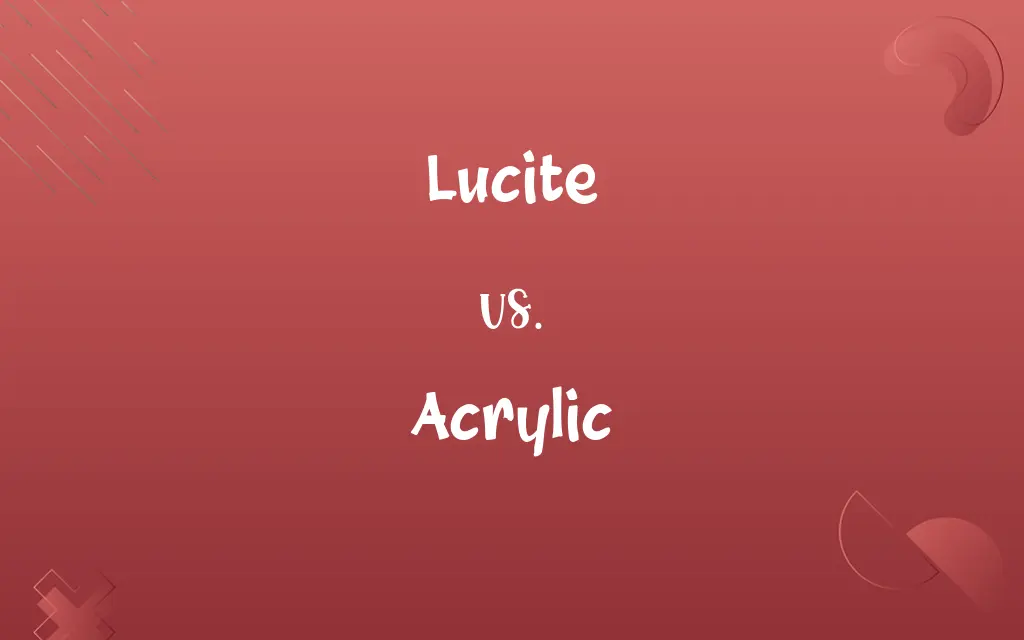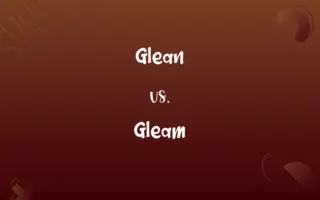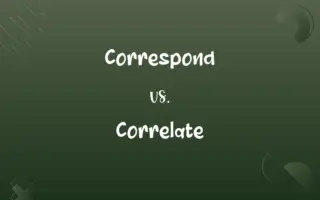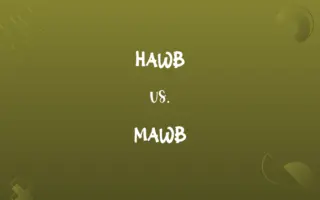Lucite vs. Acrylic: Know the Difference

By Shumaila Saeed || Updated on December 25, 2023
Lucite is a brand name for a type of acrylic resin, known for its clarity and high quality. Acrylic refers to any plastic made from polymethyl methacrylate, including Lucite.

Key Differences
Lucite is a specific brand of acrylic resin, renowned for its exceptional clarity and often used in high-end products. Acrylic, in general, is a broader category of thermoplastic materials derived from polymethyl methacrylate, offering versatility in use.
Shumaila Saeed
Nov 26, 2023
In terms of manufacturing, Lucite often undergoes a more refined production process, contributing to its premium quality and appearance. Acrylic materials, on the other hand, can vary widely in quality depending on the manufacturing process and additives used.
Shumaila Saeed
Nov 26, 2023
Lucite is frequently chosen for applications where aesthetic appeal is paramount, such as in fashion accessories or modern furniture. Acrylic serves a broader range of applications, from practical uses like protective screens to artistic uses in paints.
Shumaila Saeed
Nov 26, 2023
The cost aspect often differentiates the two; Lucite typically commands a higher price due to its brand recognition and perceived quality. Acrylic is more affordable and accessible, making it a popular choice for a wide array of applications.
Shumaila Saeed
Nov 26, 2023
While Lucite stands out for its exceptional clarity and resistance to yellowing over time, Acrylic is valued for its overall strength, light weight, and resistance to impact and weathering.
Shumaila Saeed
Nov 26, 2023
ADVERTISEMENT
Comparison Chart
Typical Use
Luxury items, decorative pieces
Varied, including practical and artistic uses
Shumaila Saeed
Nov 26, 2023
Physical Properties
Exceptional clarity, less prone to yellowing
Strong, lightweight, impact-resistant
Shumaila Saeed
Nov 26, 2023
ADVERTISEMENT
Lucite and Acrylic Definitions
Lucite
A high-quality type of acrylic resin known for its clarity and durability.
The Lucite chair added a touch of modern elegance to the room.
Shumaila Saeed
Nov 21, 2023
Acrylic
A type of plastic often used as a glass alternative due to its clarity and strength.
They installed acrylic windows in the greenhouse for better durability.
Shumaila Saeed
Nov 21, 2023
Lucite
A brand name for a specific acrylic plastic, often used in luxury goods.
Her Lucite jewelry collection was admired for its clear, glass-like appearance.
Shumaila Saeed
Nov 21, 2023
Acrylic
A transparent plastic material, known for being lightweight and shatter-resistant.
The acrylic display case was perfect for showcasing the collectibles.
Shumaila Saeed
Nov 21, 2023
Lucite
A branded acrylic product noted for its resistance to weathering and yellowing.
The outdoor sign was made of Lucite to ensure longevity and clarity.
Shumaila Saeed
Nov 21, 2023
ADVERTISEMENT
Acrylic
A synthetic polymer used in a wide range of applications, from paints to plastics.
The artist used acrylic paints for their vibrant colors and quick drying time.
Shumaila Saeed
Nov 21, 2023
Lucite
A material favored for its glass-like transparency and used in high-end designs.
The Lucite table, with its crystal-clear surface, was the centerpiece of the lobby.
Shumaila Saeed
Nov 21, 2023
Acrylic
A material commonly used in manufacturing due to its moldability and versatility.
The company specialized in custom acrylic fabrications for industrial use.
Shumaila Saeed
Nov 21, 2023
Lucite
A type of thermoplastic used in making various decorative items and furniture.
The designer opted for Lucite for the light fixtures, capitalizing on its translucent quality.
Shumaila Saeed
Nov 21, 2023
Acrylic
A term for a group of thermoplastics that are easily colored and shaped.
Acrylic beads were chosen for the necklace for their lightweight and bright colors.
Shumaila Saeed
Nov 21, 2023
Lucite
A brand name for a transparent plastic based on methyl methacrylate esters; the term is often used generically to refer to any similar transparent plastic. It is sold in various forms, including rigid sheets which may be used as a substitute for glass in windows.
Shumaila Saeed
Oct 19, 2023
Acrylic
(painting) A paint containing an acrylic resin.
When it comes to painting, I prefer using acrylics as my medium.
Shumaila Saeed
Oct 19, 2023
Acrylic
Of or containing acryl, the hypothetical radical of which acrolein is the hydride; as, acrylic acid. The characteristic residue in an acrylic compound is the carbonyl group attached directly to an ethylenic carbon.
Shumaila Saeed
Oct 19, 2023
Acrylic
A paint in which the pigment is suspended in a solution of an acrylic resin, which dries to a hard film on exposure to air.
Shumaila Saeed
Oct 19, 2023
Acrylic
A glassy thermoplastic; can be cast and molded or used in coatings and adhesives
Shumaila Saeed
Oct 19, 2023
Repeatedly Asked Queries
Can Lucite yellow over time?
Lucite is known for its resistance to yellowing, maintaining its clarity longer than some other acrylics.
Shumaila Saeed
Nov 26, 2023
Is Acrylic durable?
Yes, acrylic is known for its durability, being lightweight, impact-resistant, and shatter-resistant.
Shumaila Saeed
Nov 26, 2023
How does Acrylic differ from Lucite?
Acrylic is a general term for plastic materials made from polymethyl methacrylate, while Lucite is a premium brand of acrylic.
Shumaila Saeed
Nov 26, 2023
Can Acrylic be used outdoors?
Yes, acrylic is weather-resistant and can be used in outdoor applications.
Shumaila Saeed
Nov 26, 2023
What is the weight comparison between Lucite and glass?
Lucite is much lighter than glass, making it easier to handle and install.
Shumaila Saeed
Nov 26, 2023
Is Lucite a type of glass?
No, Lucite is a type of plastic that resembles glass but is lighter and more shatter-resistant.
Shumaila Saeed
Nov 26, 2023
Why is Lucite preferred for luxury items?
Lucite's superior clarity and quality make it a preferred choice for luxury and decorative items.
Shumaila Saeed
Nov 26, 2023
Can Acrylic be recycled?
Yes, acrylic can be recycled, although the process is more complex than recycling other plastics.
Shumaila Saeed
Nov 26, 2023
Can Lucite be used in lighting fixtures?
Yes, Lucite is often used in lighting fixtures due to its light-transmitting properties.
Shumaila Saeed
Nov 26, 2023
Are Lucite products more expensive than Acrylic?
Generally, Lucite products are more expensive due to their brand recognition and high quality.
Shumaila Saeed
Nov 26, 2023
What are common uses of Acrylic?
Acrylic is used in various applications, from protective screens and windows to paints and crafts.
Shumaila Saeed
Nov 26, 2023
What is Lucite?
Lucite is a brand name for a specific type of high-quality acrylic resin.
Shumaila Saeed
Nov 26, 2023
Is Acrylic resistant to chemicals?
Acrylic has moderate chemical resistance but can be damaged by certain solvents and cleaners.
Shumaila Saeed
Nov 26, 2023
Does Acrylic scratch easily?
Acrylic can scratch more easily than glass, but it's more impact-resistant.
Shumaila Saeed
Nov 26, 2023
Can Lucite be molded?
Yes, Lucite can be thermoformed or molded into various shapes.
Shumaila Saeed
Nov 26, 2023
Is Acrylic safe for food contact?
Food-safe acrylics are available, but not all acrylic products are automatically safe for food contact.
Shumaila Saeed
Nov 26, 2023
What are the thermal properties of Acrylic?
Acrylic has good thermal properties, withstanding various temperatures without losing clarity.
Shumaila Saeed
Nov 26, 2023
How is Lucite manufactured?
Lucite is manufactured through a process of polymerization of methyl methacrylate.
Shumaila Saeed
Nov 26, 2023
Can Lucite be used in art?
Yes, Lucite is used in art, especially in sculptures and installations for its aesthetic appeal.
Shumaila Saeed
Nov 26, 2023
Is Lucite environmentally friendly?
Like other plastics, Lucite has environmental impacts, but efforts are made to recycle and reduce waste.
Shumaila Saeed
Nov 26, 2023
Share this page
Link for your blog / website
HTML
Link to share via messenger
About Author
Written by
Shumaila SaeedShumaila Saeed, an expert content creator with 6 years of experience, specializes in distilling complex topics into easily digestible comparisons, shining a light on the nuances that both inform and educate readers with clarity and accuracy.






































































